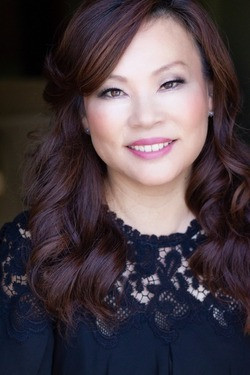Comfort Woman
By Tanya Ko Hong
14 August 1991, Seoul, South Korea:
A woman named Hak Soon Kim [Kim Hak-Sun,
1924–1997] came forward to denounce the Japanese
for the sexual enslavement of more than 200,000 women during World War II. They were known as “Wianbu”
in Korean and “Comfort Women” in English.
1991, Seoul, South Korea
The voice on TV is comforting,
like having a person beside me
talking all the time
while I eat my burnt rice gruel.
Suddenly in Japanese:
But we didn’t—
Those women came to us
for the money.
We never forced—
I dropped
my spoon into my nureun bap.
On the screen
a photograph of young girls
seated in an open truck
like the one I rode with Soonja
over the rice-field road years ago.
3 a.m.
Waking in a cold sweat
I gulp Jariki
bul kuk
bul kuk
but my throat still burns.
I reach for a cigarette
and the white smoke spirals
like Soonja’s wandering soul...
They called me wianbu—
a comfort woman—
but I had a name.
1939, Chinju, South Kyangsan Province
We are going to do Senninbari, right?
No, Choingsindae, Women’s Labor Corps.
Same thing, right?
Earn money
become new woman
come back home soon—
Holding tiny hands
fingertips
bong soong ah
balsam-flower red
colored by summer’s end
Ripening persimmons
bending over the Choga roofs
fade into distance
When the truck crosses the last hill
leaving our hometown in the dust
Soonja kicks off her white shoes
1941, That Autumn
Autumn night, Japanese
soldiers wielding swords
dragged me away
while I was gathering pine needles
that fell from my basket
filling the air with the scent
of their white blood
When you scream in your dream
there’s no sound
On the maru, Grandma’s making Songpyeon,
asking Mom, Is the water boiling?
Will she bring pine needles before
my eyeballs fall out?
I feel pain
there—
They put a long stick between my legs—
Open up, open, Baka Chosengjing!
they rage, spraying
their sperm
the smell of
burning dog
burning life
panting
grunting on top of me
Under my blood I am dying
1943, Shanghai, China
One night
a soldier asked all the girls
Who can do one hundred men?
I raised my hand
Soonja did not
The soldiers put her in boiling water
alive
and fed us
What is living?
Is Soonja living in me?
1946, Chinju, Korea
One year after
liberation
I came home
Short hair
not wearing hanbok
not speaking clearly
Mother hid me
in the back room
At night she took me to the well
and washed me
Scars seared with hot steel
like burnt bark
like roots of old trees
all over my body
Under the crescent glow
she smiled when she washed me
My baby! Your skin is like white jade, dazzling
She bit her lower lip
washing my belly softly
but they had ripped open my womb
with the baby inside
Mother made white rice and seaweed soup
put my favorite white fish on top
But Mother, I can’t eat flesh
That night in the granary
she hanged herself
left a little bag in my room
my dowry, with a rice ball
Father threw it at me
waved his hand toward the door
I left at dusk
30 years
40 years
forever
Mute
mute
mute
bury it with me
They called me wianbu—
I had a name
1991, 3:00 AM
(That night
the thousand blue stars
became white butterflies
through ripped rice paper
and flew into my room
One
One hundred
One thousand butterflies—
Endless white butterflies going through
the web in my mouth
into my unhealed red scars
stitching one by one
butterflies lifting me
heavier than the dead
butterflies opening my bedroom door
heavier than shame)
At
dawn,
I stand.
(Read the poem in Korean)
Footnotes:
- Baka Chosengjing: a derogatory term translated loosely as “stupid Korean” and conveying contempt for a culture the soldiers despised
- bong soong ah: a traditional Korean plant dye made from the Garden Balsam flower, used to color fingernails and fingertips
- Jariki: drinking water placed at bedside
- maru: traditional Korean floor made of wood
- nureun bap: scorched rice re-boiled with water
- Songpyeon: traditional Korean rice cake for Chusuk holiday

About the poet:
Tanya (Hyonhye) Ko Hong (고현혜) is an internationally published, award-winning poet, translator, playwright, and cultural curator, whose work bridges Korean and Korean-American experiences. Born and raised in South Korea, she immigrated to the USA at eighteen. She is the author of five books, including Generation 1.5 (일점오세): Poems in Korean, Mother to Myself (나는 나의 어머니가 되어, 푸른사상, 2015), and The War Still Within (KYSO Flash Press, 2019).
Her work has received international recognition, including Honorary Awards from Laayoune, Morocco (2024); the Medada Award at the Ditët e Naimit International Poetry Festival, Tetovo (2023); the Dritëro Agolli Award at the International Korçare Poetry Festival (2022); Ko Won’s 10th Literary Award (2021); and the Yun Doon-ju Korean-American Literature Award.
Her multi-part poem, “Comfort Woman,” which received an honorable mention from the Women’s National Book Association, has been developed into a play, with a staged reading in New York City in 2025. Her poems have been translated into Albanian, Arabic, Bosnian, Korean, Japanese, and Spanish. She is the first—and remains the only—translator of Arthur Sze’s poems into Korean, most recently published in 2025, the year he was named U.S. Poet Laureate. Tanya holds an MFA in Creative Writing from Antioch University, Los Angeles.
More information: www.tanyakohong.com
